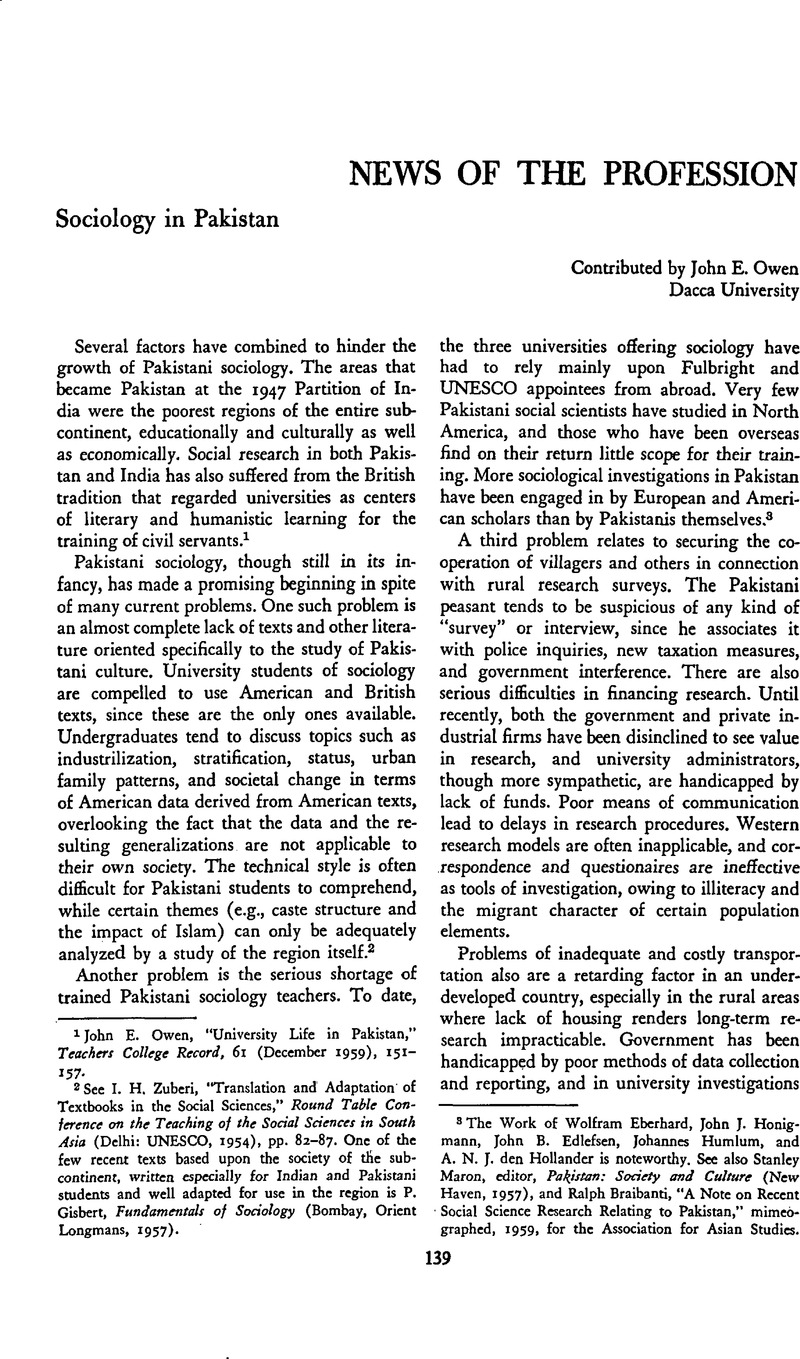No CrossRef data available.
Article contents
Sociology in Pakistan
Published online by Cambridge University Press: 23 March 2011
Abstract

- Type
- News of the Profession
- Information
- Copyright
- Copyright © The Association for Asian Studies, Inc. 1960
References
1 Owen, John E., “University Life in Pakistan,” Teachers College Record, 61 (December 1959), 151–157.Google Scholar
2 See Zuberi, I. H., “Translation and Adaptation of Textbooks in the Social Sciences,” Round Table Conference on the Teaching of the Social Sciences in South Asia (Delhi: UNESCO, 1954). pp. 82–87Google Scholar. One of the few recent texts based upon the society of the subcontinent, written especially for Indian and Pakistani students and well adapted for use in the region is Gisbert, P., Fundamentals of Sociology (Bombay, Orient Longmans, 1957).Google Scholar
3 The Work of Wolfram Eberhard, John J. Honigmann, John B. Edlefsen, Johannes Humlum, and A. N. J. den Hollander is noteworthy. See also Maron, Stanley, editor, Pakistan: Society and Culture (New Haven, 1957)Google Scholar, and Ralph Braibanti, “A Note on Recent Social Science Research Relating to Pakistan,” mimeographed, 1959, for the Association for Asian Studies.
4 See S. M. H. Zaidi, “Some Sociopsychological Problems of Research in Pakistan,” The Indian Journal of Social Work (September 1957). An unpublished paper by Farouk, Abdul and Husain, A. F. A., “Experience of Field Work in Survey Research in East Pakistan,”presented at a UNESCO Conference on Methods of Social Research,Calcutta,December 1958Google Scholar, dealt with issues in field work data-collection within the context of East Bengal culture.
5 Eberhard, Wolfram, “Social Research at Pakistani Universities,” The Asia Foundation, Program Bulletin No. 5 (December 1957), p. 2.Google Scholar
6 Eberhard, pp. 2–3.
7 Smitter, Faith and Dar, Iqbal, Growing Up in Pakistan (Lahore, 1957).Google Scholar
8 Bertrand, Andre, The Teaching of the Social Sciences in Pakistan, Report on a Mission (Paris, 1955), p. 15.Google Scholar
8 Karim, A. K. Nazmul, Changing Society in India and Pakistan (Dacca, 1956).Google Scholar
10 Report on the Survey of Rural Credit and Rural Unemployment in East Pakistan (Dacca, 1956).Google Scholar
11 Research into rural credit in what is now East Pakistan can be traced back to 1925, when the British Government initiated inquiries, e.g., the Royal Commissions on labor and agriculture. A plot enumeration (agricultural census) of Bengal was made in 1944, using the random sample technique to ascertain the indebtedness of rural families.
12 Husain, A. F. A., Human and Social Impact of Technological Change in Pakistan, a Report on a Survey conducted by the University of Dacca (Dacca, 1956)Google Scholar. A shorter version of the same report, bearing the above title, is available in a UNESCO publication issued from the UNESCO Research Center for S. E. Asia, Calcutta, 1956.
13 Husain, A. F. A., Employment of Middle Class Muslim Women in Dacca (Dacca, 1958).Google Scholar
14 Matlub Hussain, “A Socio-Economic Survey of Village Baffa in the Hazara District of the Peshawar Division,” Publication No. 5 (Board of Economic Inquiry, North-West Frontier, Peshawar University, 1958). No survey of this nature had previously been conducted in die N. W. Frontier Province. Other publications of the Board of Economic Inquiry include M. A. Sethi, “Family Budgets of Low-Paid Employees of Educational Institutions in the former N. W. Frontier Province, 1953–54”; N. I. Mian, “A Preliminary Economic Survey of the Tribal Areas Adjoining West Pakistan”; and Salma Sami, “A Survey of Female Education in the Peshawar District, 1957–58.”
15 One of the few inquiries in this field is Aird, John S., “Fertility Levels and Differentials in Two Bengali Villages,” (unpublished doctoral dissertation, University of Michigan, 1956).Google Scholar
16 Several Pakistani graduates are studying sociology at the University of Chicago, Pennsylvania State, Michigan State, and Minnesota Universities, and more than ten U. S. sociologists have received Fulbright grants to Pakistani universities.
17 Mention should be made of the Planning Board Library, with a large number of reports submitted by foreign advisers, the library of the Food and Agriculture Council, and the libraries of the Ministry of Labor and the State Bank of Pakistan.




